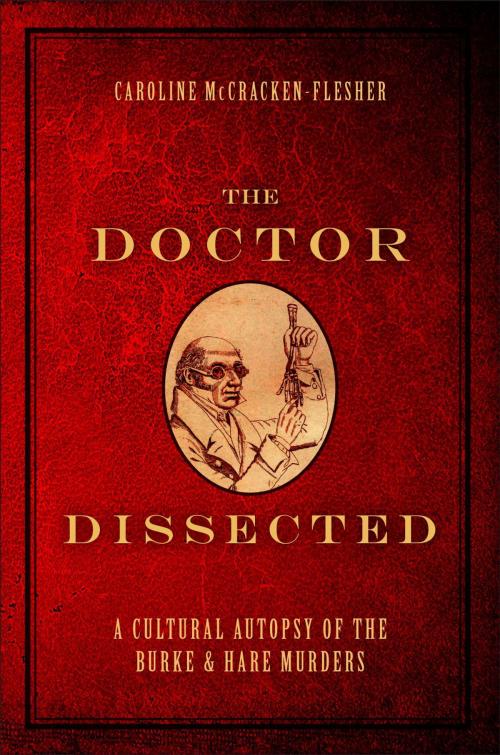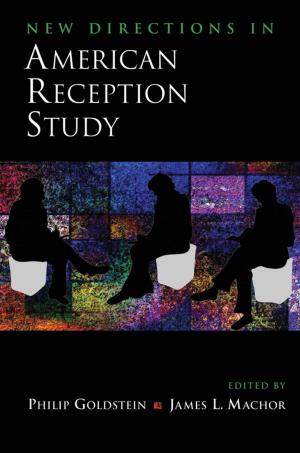The Doctor Dissected
A Cultural Autopsy of the Burke and Hare Murders
Fiction & Literature, Literary Theory & Criticism, Drama History & Criticism, British, Nonfiction, History| Author: | Caroline McCracken-Flesher | ISBN: | 9780190208592 |
| Publisher: | Oxford University Press | Publication: | January 27, 2012 |
| Imprint: | Oxford University Press | Language: | English |
| Author: | Caroline McCracken-Flesher |
| ISBN: | 9780190208592 |
| Publisher: | Oxford University Press |
| Publication: | January 27, 2012 |
| Imprint: | Oxford University Press |
| Language: | English |
A series of bizarre disappearances filled the citizens of early nineteenth-century Scotland with terror. When the perpetrators were finally apprehended in 1828, their motive roiled the nation: William Burke and William Hare had murdered for profit. The cadavers supplied a ready payout, courtesy of Dr. Robert Knox, who was desperate for anatomical subjects. Nearly two hundred years later, these scandalous murders continue to fire imagination in Scotland and beyond. From the start, the sensational events provoked artists and writers. While Sir Walter Scott resisted public comment, his correspondence gives his trenchant private opinion and shows him working busily behind the scenes and against the doctor. Many more mined the news outright. Serial novelist David Pae exploited the disturbance to lobby for religious belief in an increasingly secular world. A subsequent generation resurrected the grisly drama as fodder for the Victorian gothic-the murders figure prominently in Robert Louis Stevenson's "The Body Snatcher" and, more obliquely, in Strange Case of Dr. Jekyll and Mr. Hyde. The twentieth century saw the specters of Burke and Hare emerge in James Bridie's play The Anatomist, Hollywood horror films, television programs like Alfred Hitchcock Presents, and Frankensteinian retellings from Alasdair Gray. In this century, the story has been picked up by Smallville and Doctor Who. Recent allusions and reenactments range from the somber-in popular detective fiction by Ian Rankin-to the dark, camp comedy of Fringe Festival performances and the slapstick of John Landis's Burke and Hare. Featuring over thirty images and canvassing a wide range of media-from contemporary newspaper accounts and private correspondence to Japanese comic books and videogames-The Doctor Dissected analyzes the afterlife of this national trauma and considers its singular place in Scottish history.
A series of bizarre disappearances filled the citizens of early nineteenth-century Scotland with terror. When the perpetrators were finally apprehended in 1828, their motive roiled the nation: William Burke and William Hare had murdered for profit. The cadavers supplied a ready payout, courtesy of Dr. Robert Knox, who was desperate for anatomical subjects. Nearly two hundred years later, these scandalous murders continue to fire imagination in Scotland and beyond. From the start, the sensational events provoked artists and writers. While Sir Walter Scott resisted public comment, his correspondence gives his trenchant private opinion and shows him working busily behind the scenes and against the doctor. Many more mined the news outright. Serial novelist David Pae exploited the disturbance to lobby for religious belief in an increasingly secular world. A subsequent generation resurrected the grisly drama as fodder for the Victorian gothic-the murders figure prominently in Robert Louis Stevenson's "The Body Snatcher" and, more obliquely, in Strange Case of Dr. Jekyll and Mr. Hyde. The twentieth century saw the specters of Burke and Hare emerge in James Bridie's play The Anatomist, Hollywood horror films, television programs like Alfred Hitchcock Presents, and Frankensteinian retellings from Alasdair Gray. In this century, the story has been picked up by Smallville and Doctor Who. Recent allusions and reenactments range from the somber-in popular detective fiction by Ian Rankin-to the dark, camp comedy of Fringe Festival performances and the slapstick of John Landis's Burke and Hare. Featuring over thirty images and canvassing a wide range of media-from contemporary newspaper accounts and private correspondence to Japanese comic books and videogames-The Doctor Dissected analyzes the afterlife of this national trauma and considers its singular place in Scottish history.















